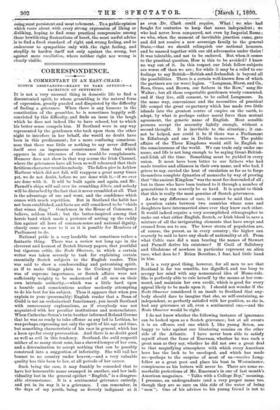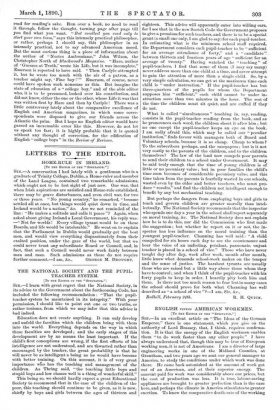CORRESPONDENCE.
A COMMENTARY IN AN EASY-CHAIR :
IT is not a very unusual thing in domestic life to find a discontented Spirit, to whom grumbling is the natural form of expression, greatly puzzled and disquieted by the difficulty of finding a grievance. When there is any humour in the constitution of the grumbler, he is sometimes happily self- convicted by this difficulty, and finds an issue in the laugh which he does not indeed like to have echoed, but to which his better sense compels him. If Scotland were in any way represented by the gentlemen who took upon them the other night to interfere in her behalf, she would no doubt have been in this predicament; for a more confusing conscious- - ness that there was little or nothing to say never diffused itself over an ingenuous countenance than that which appears in the utterance of these would-be complainants. Humour does not show in that way across the Irish Channel, where the grievances have all been so well rehearsed that their fictitious character troubles nobody. The fallen pier in Arklow Harbour which did not fall, will reappear a great many times yet, we do not doubt, before we are done with it,—if we ever are done with it. It will be built again and again, and Mr. Parnell's ships will sail over its crumbling debris, and nobody will be disturbed by the fact that it never crumbled at all. That is the advantage of use and wont, and the confidence which comes with much repetition. But in Scotland the habit has not been established, and facts are still considered to be " chiels that winna ding." Gentlemen in the House of Commons, I believe, seldom blush ; but the better-inspired among that heroic band which made a pretence of setting up the ruddy lion against all laws of common-sense and national dignity, clearly came as near to it as it is possible for Members of Parliament to do.
National pride is a very laudable but sometimes rather a fantastic thing. There was a review not long ago in the cleverest and keenest of Scotch literary papers, that youthful but vigorous critic, the Scots Observer, in which a certain writer was taken severely to task for explaining certain essentially Scotch subjects to the English reader. This was said to show a condescending and patronising spirit, as if to make things plain to the Cockney intelligence was of supreme importance, or Scotch affairs were not sufficiently weighty to be understood of all men on their own intrinsic authority,—which was a little hard upon a humble and conscientious author modestly attempting to do his best for his subject. Thus it appears that when you explain to your (presumably) English reader that a Dean of Guild is not an ecclesiastical functionary, you insult Scotland with unnecessary explanations, as if everybody was not acquainted with her peculiar institutions and nomenclature. When Catherine Seton's twin-brother informed Roland Gimme that he Wail as ready to take offence as any lad in Lothian, he was perhaps expressing not only the spirit of his age and time, but, something characteristic of his race in general, which has a keen eye for every provocation. And there is no doubt good as well as evil in this tendency. Scotland, the auld respectit wither of so many stout sons, has a shrewd temper of her own, and a determination to accept nothing that can be possibly construed into a suggestion of inferiority. She will vail her bonnet to no country under heaven,—and a very valuable quality has this been to her, at all periods of her career.
Such being the case, it may frankly be conceded that to have her honourable name swamped in another, and her indi- viduality lost in the general epithet "English," is a disagree- able circumstance. It is a sentimental grievance entirely, and yet. in its way, it is a grievance. I can remember, in the days of my youth, being as fiercely indignant at it as even -Dr,, Clark.could reqnire. -What ! we who - ha& fought for centuries to keep that name independent ; we who had rtever been conquered, not even by, Imperial Rome ; we who, when the moment Of inevitable junction came, gave an& did not receive a new sovereign gamily to the general State,—that we should relinquish our national honours, and be massed together with our old adversaries under theirs r It was tolerable, and not to be, endured But when it comes to the practical question, How is this to be avoided P I know no way out of it. In this respect our Irish fellow-subjects are worse off than we are ; for while- it may be a relief to our feelings to say British—British-and-Irelandish is beyond all the possibilities. There is a certain well-known firm of which the partners are (or were) legion. "Longman,- Hurst, and Co., Rees, Orme, and Brown, our fathers in the Row," sang Sir Walter ; but all these respectable gentlemen wisely consented, and if they live, still consent, to be called Longman& In the same way, convenience 'and the necessities of practical life compel the great co-partnery which has made two little islands into the greatest centre of empire on the earth, to adopt, by what is perhaps rather moral force than mutual agreement, the generic name of Etglish. Most sensible persons accept the necessity lightly enough, without a second thought. It is inevitable to the situation ; it can- not be helped, nor, could it be if there was a Parliament in Edinburgh and one in Dublin to-morrow. The public affairs of the Three Kingdoms would still be. English to the consciousness of the world. We can trade only under one name, and life is not long enough to be saying Great-British- and-Irish all the time. Something must be yielded in every union. It must have been bitter to our fathers who had made treaties and alliances in their own name, and who had, I grieve to say, carried the heat of emulation so far as to forge themselves complete dynasties of monarchs by way of proving that "the ancient Kingdom" was the most far-descended of all ; but to those who have been trained to it through a number of generations it can scarcely be so hard. It is quaint to think that this is really the most genuine of Scotch grievances.
As for any difference of race, it cannot be said that such a question exists between two countries whose sons and daughters have intermarried since ever they knew each other.. It would indeed require a very accomplished ethnographer to make out what either English, Scotch, or Irish blood is, save a mixture of all the invigorating elements that have swept and crossed from sea to sea. The lower strata of population are, of course, the purest, as in every country ; the higher can scarcely be said to have any shade of nationality at all. From what Celtic race did a man bearing the names of Stewart and Parnell derive his existence If Cecil of Salisbury and Gladstone of nowhere in particular represent an alien race, what does he P Brian Boroihne, I fear, had little hand in him,
It is a very good thing, however, for all men to see that Scotland is far too sensible, too dignified, and too busy to occupy her mind with any nonsensical idea of Home-rule. She is perfectly able to rule herself by the means at her com- mand, and maintain her own credit, which is good for every appeal likely to be made upon it. I should not wonder if the- Sects Observer considered it an insult to Scotland that any- body should dare to imagine that she, so self-sustaining, so independent, so perfectly satisfied with her position, as she is,. had any grievance at all,, even a sentimental one,—and the Scots Observer would be right.
I do not know whether the following instance of ignorance can be looked upon as a Scotch grievance; but at all events it is an offence, and one which I, like young Scion, am happy to take against our blustering cousins on the other side of the Atlantic. I have never been able to satisfy myself about the fame of Emerson, whether he was such a great man as they say, whether he did not owe a great deal to that magnifying atmosphere with which every American hero has the luck to be enveloped, and which has made us—perhaps to the surprise of most of us—receive Long- fellow as a great poet and place his bust in Westminster, conspicuous as his betters will never be. There are some re- markable prelections of Mr. Emerson's in one of last month's American magazines. "Talks with a College Boy," meaning, I presume, an undergraduate (and a very proper name too, thongh they are so sure on this side of the water of being " men "). One of his advises to his young friend is not to
read for reading's sake. Run over a book, no need to read it through, follow the thought, turning page after page till you find what you want. "But recollect you read only to start your own team," says this intensely practical philosopher, or rather, perhaps I should say, this philosopher in an intensely practical, not to say advanced American mood. But the most curious thing is a piece of information about the author of " Noctes Ambrosianm," John Wilson, the Christopher North of Blackwood's Magazine. "Hare, author of. Guesses at Truth,' wrote his Life, but it was incomplete," Emerson is reported to have said. "Then Carlyle attempted it, but he wrote too much with the air of a patron, as a teacher might say, Fine boy !" Emerson, of course, never could have spoken such nonsense as this. But imagine the state of education of a "college boy," and of the able editor who, it is to be presumed, looked over his contribution, and did not know, either the one or the other, whose Life it was that was written first by Hare and then by Carlyle ! There was a little controversy lately about the comparative excellence of English and American magazines, in which some corre- spondents were disposed to give our friends across the Atlantic the palm. But I hope no English editor would have passed an inexcusable error like this. However, do not let us speak too fast ; it is highly probable that it is quoted without any thought of correction, for the edification of English "college boys" in the Review of Reviews.







































 Previous page
Previous page